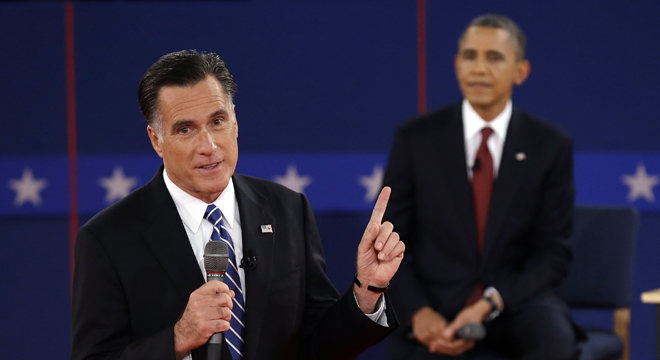The advocacy group that provided Mitt Romney’s 2002 Massachusetts gubernatorial team with the “binders full of women” Romney referenced in Tuesday night’s presidential debate says the Republican presidential nominee didn’t exactly have the facts right when he told the tale at Hofstra University.
The binders of prospective female appointees that Romney claimed to have had compiled upon being elected to the top job in the Bay State a decade ago were actually made without his guidance before he won, officials with MassGAP, an advocacy group focused on getting more women into top Massachusetts government jobs, said Wednesday.
“While MassGAP is a nonpartisan effort, its organizers feel it is imperative to set the record straight about the efforts it spearheaded in 2002 and the results of that effort,” Marissa Szabo, associate director of the MA Women’s Political Caucus (lead sponsor of MassGAP) told TPM Wednesday.
Here’s how Romney told the story on the debate stage Tuesday.
“We took a concerted effort to go out and find women who had backgrounds that could be qualified to become members of our cabinet,” he said. “I went to a number of women’s groups and said, ‘Can you help us find folks,’ and they brought us whole binders full of women.”
Â
Â
Â
Â
That’s not really how it went down, MassGAP says. The process actually began as a bipartisan push for more women in government that started while the 2002 governor’s race was underway in Massachusetts. MassGAP’s description, from a statement provided to TPM:
Prior to the 2002 gubernatorial election, MassGAP approached the campaigns of candidates Shannon O’Brien and Mitt Romney and asked them both to commit to: (1).”Make best efforts” to ensure that the number of women in appointed state positions is proportionate to the population of women in Massachusetts; (2). Select a transition team whose composition is proportionate to the women in the Commonwealth; and (3). Meet with MassGAP representatives regularly during the appointments process. Both campaigns made a commitment to this process.
Following the election, MassGAP formed committees for each cabinet post in the administration and began the process of recruiting, interviewing, and vetting women applicants. Those committees selected top applicants for each position and presented this information to the administration for follow-up interviews and consideration for appointment.
Past officials from MassGAP told a similar story to multiple reporters Wednesday.
The Romney campaign acknowledged MassGAP played a role in the binders story, but declined to give specifics.
“The incoming Romney administration worked with MassGAP to find the best qualified women for top positions in Massachusetts government,” Romney spokesperson Amanda Henneberg told TPM. “The efforts resulted in Massachusetts having the most women in top positions in the entire country.”
An anonymous Romney official went into more detail with to CBS News, acknowledging that Romney took the MassGAP pledge and saw their list of women.
“When Governor Romney came into office he undertook to fulfill his pledge. And while many of the top positions were filled by women who Gov. Romney found on his own through the transition process, through his business contacts, he also worked very cooperatively with the Massachusetts Women’s Caucus and reached out to them to make use of them and their resources,” the Romney official said. “We didn’t have to accept those names, we didn’t have to ask them for it to fulfill the pledge.”
The Romney source told CBS the new governor hired around 10 women to top gigs in his administration and “roughly two or three” of them were on MassGAP’s list.
CBS declared Romney’s statement at Hofstra “misleading.”
MassGAP points out that regardless of how his binders came together, Romney wasn’t all that successful by the end of his four-year term when it came to achieving MassGAP’s goal of putting more women in Massachusetts leadership.
“Prior to the 2002 election, women comprised approximately 30 percent of appointed senior-level positions in Massachusetts government. By 2004, 42 percent of the new appointments made by the Romney administration were women,” MassGAP said in the Wednesday statement. “Subsequently, however, from 2004-2006 the percentage of newly-appointed women in these senior appointed positions dropped to 25 percent.”
This post has been updated.






